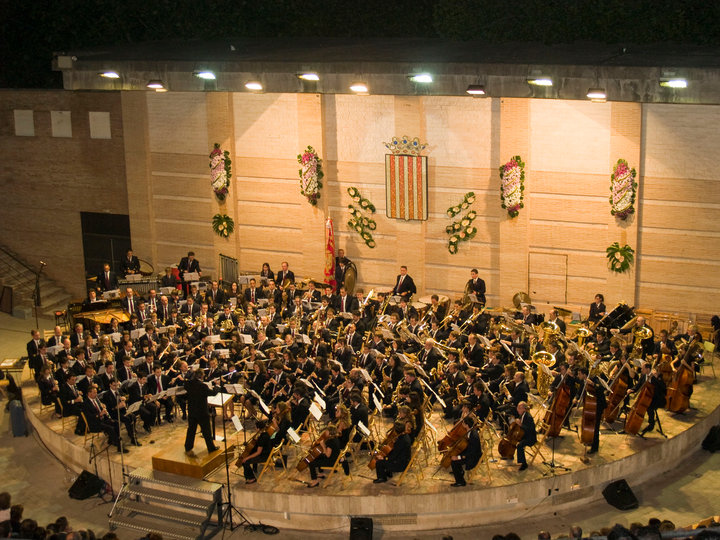
Tag: symphonic wind band


On Mount Sinai (2004)
Poem for Symphonic Wind Band
- Duration: ca. 17 minutes
- Picc, 2 Fls, Ob, Bsn, P.Cl, 3 Cls, B. Cl, Shofar (ad libitum), 2 A. Sxs, T. Sx, B. Sx, 4 Hns, 4 Tpts, 3 Tbns, Bar, 2 Tbas, Str. Bass, Timp, Perc (5).
The performance of the poem begins with narration of the following scene from the Bible:
And it came to pass on the third day in the morning,
that there were thunders and lightnings,
and a thick cloud upon the mountain, and the sound of a shofar exceeding loud;
so that all the people in the camp trembled.
And Moshe brought the people out of the camp to meet with GOD;
And they stood at the foot of the mountain.
And mount Sinay smoked in every part,
because the LORD descended upon it in fire:
and the smoke of it ascended like the smoke of a furnace,
and the whole mountain quaked greatly.
And then the voice of the shofar sounded louder and louder…
…And all the people perceived the thunderings, and the lightnings,
and the sound of the shofar, and the mountain smoking:
and when the people saw it, they were shaken, and stood afar off…
…And the LORD came down upon mount Sinay,
on the top of the mountain…”
EXODUS 19 (16 – 19), 20 (15), 19 (20).
In 2004, M. Delman and the Petach Tikva Conservatoire Wind Orchestra premiered this work in Israel. They performed it again at the wind orchestra competition in Interlaken, Switzerland, and then two days later at the Mid-Europe festival in Shladming, Austria.
The evening after the performance in Interlaken, M. Delman felt strong pain, caused by acute appendicitis. He was hospitalized and had emergency surgery.
We were sure that the performance in Shladming would have to be cancelled, but, two days later, M. Delman went on to conduct his orchestra at the festival!
Such was his strength of will and creative dedication!
Below is the recording from the premiere.
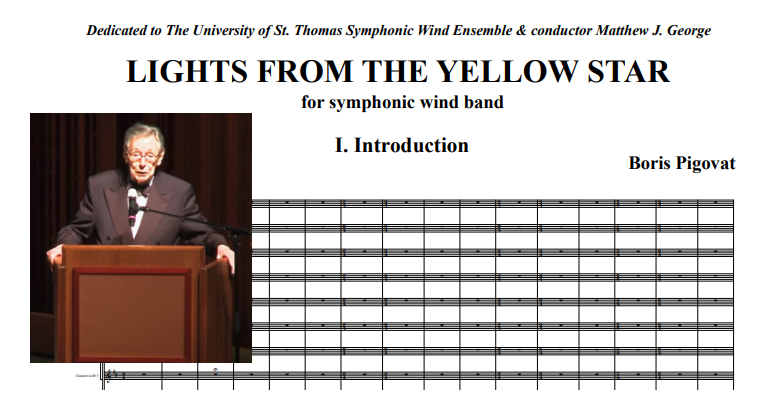
Light from the Yellow Star (2011)
For Symphonic Wind Band
- Duration: ca. 40 minutes
- Picc, 2 Fls, A.Fl, Obs, Bsns, P.Cl, 3 Cls, B.Cl, C-b.CL, S.Sx (= A.Sx.1), 2 A.Sxs, T.Sx, B.Sx, 4 Hns, 5 Tpts, 4 Tbns, Bar, 2 Tbas, Str.B, Synth, Timp, Perc (5), Solo Soprano.
In 2010, Matthew J. George, a conductor of the University of St. Thomas Symphonic Wind Ensemble, proposed that I write a composition based on books and paintings by the Holocaust survivor Dr. Robert O. Fisch.
Inspired by Dr. Fisch works, I wrote a suite of five parts:
I. Introduction
II. When the Stones weep
III. 1956
IV. Silent Music
V. Song of Love and Hope
The premiere took place in Minneapolis, in 2011, with the participation of Dr. Fisch himself; he read fragments from his books before each part of the suite and at the end of the composition. His paintings were demonstrated on a large screen during the performance. Dr. George even brought a dance ensemble for the performance!
It was extraordinary event with a big emotional impact on the audience. I invite you to view it (below are eleven clips from the premiere):
Later Matthew J. George and the University of St. Thomas Symphonic Wind Ensemble recorded Light from the Yellow Star, which was released in 2016 by the Innova label, as part of their album Persistence.
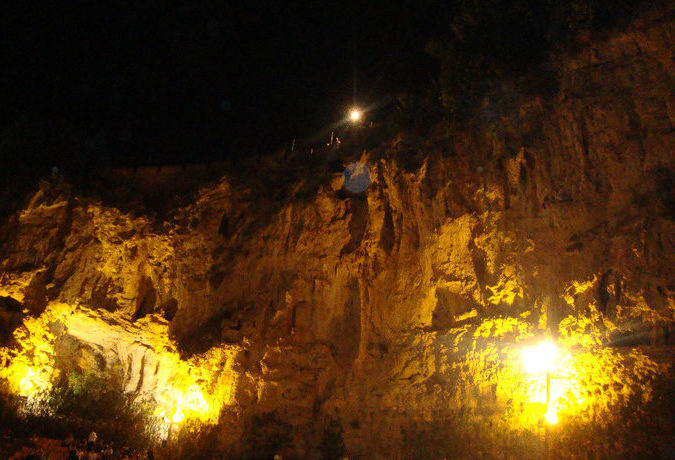
Aug, 2010: Wind of Yemen at Mano a Mano, Bunol, Spain
- Duration: ca. 18 minutes
- Picc, Fl, Ob, Bsn, P.Cl, 3 Cls, A.Cl, B.Cl, A.Sx, T.Sx, B.Sx, 4 Hns, 3 Cnts, 2 Tpts, 3 Tbns, Bar, Tba, Str. Bass, Timp, Perc (4-5)
The symphonic poem Wind of Yemen for Symphonic Wind Band was performed at Mano a Mano festival, in August 2010 in Bunol, Spain, by the CIM La Armónica de Buñol (Valencia), conducted by Frank De Vuyst.
I was excited to receive an invitation to that event and to have an opportunity to work with such great performers!
More words are redundant, just listen to the recording from the concert, below.
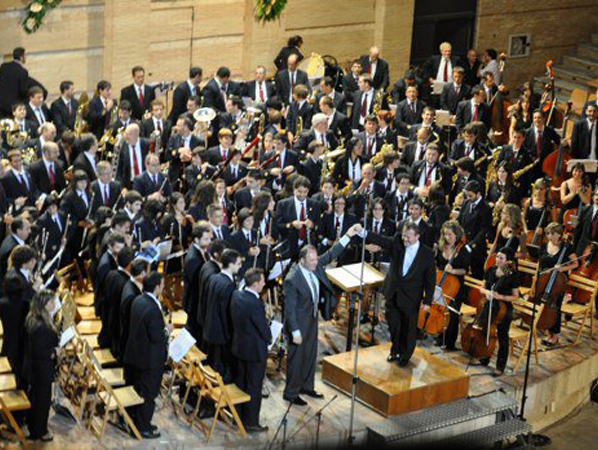
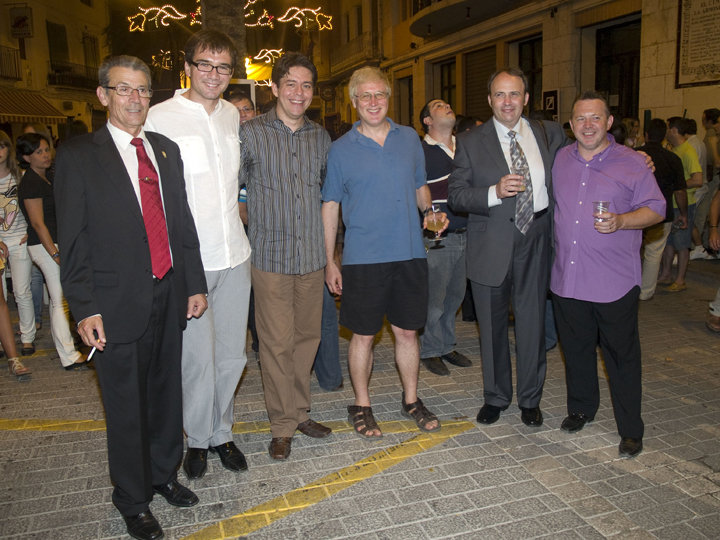
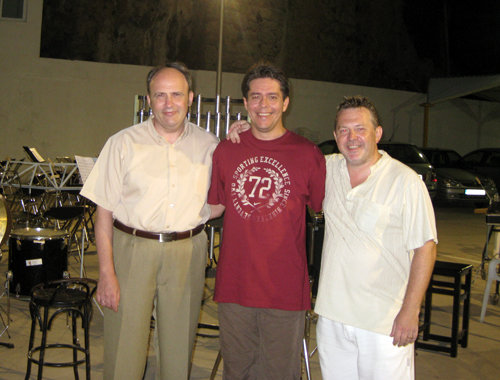
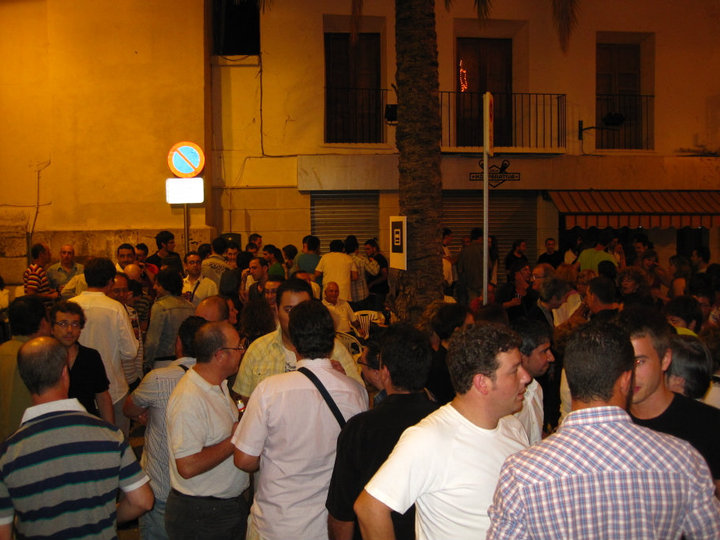
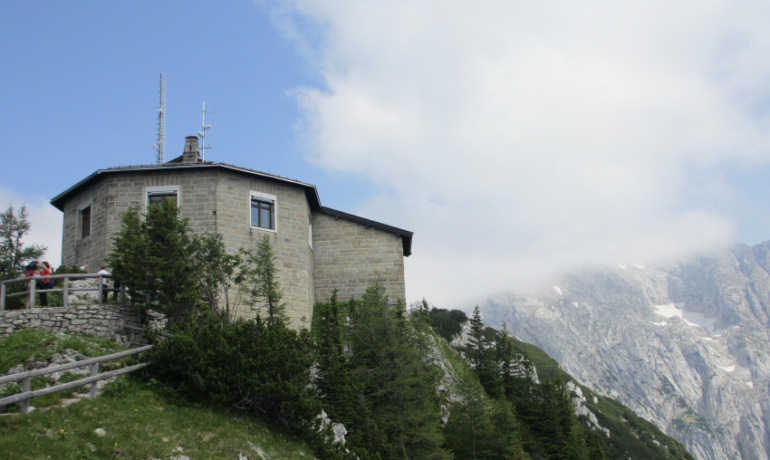
Lest We Forget (2009)
For Symphonic Wind Band / For Symphony Orchestra
- Duration: ca. 16 minutes
- SWB: Picc, 2 Fls ( = Picc. 2,3), A.Fl, Ob, Bsn, P.Cl, 3 Cls, B.Cl, 2 A.Sxs, T.Sx, B.Sx, 4 Hns, 4 Tpts, 3 Tbns, Bar, Tba, Timp, Perc (4-5).
- SO: Picc, 2 Fls ( = Picc 2, 3) 2 Obs, Eb Cl, 2 Cls, B.Cl, 2 Bsns, C-Bsn, 4 Hns, 3 Tpts, 2 Tbns, B. Tbn, Tba, Timp, Perc, Hp, Str.
Lest We Forget is a tone poem that begins with narration of the following text:
It was as in a dream:
I was standing at the top of the mountain and watching down at the Alpine valley. The view was marvelous – the green meadows surrounded by groves, small houses and herds. The pure mountain air rang as the most wonderful and fascinating music. Calm and serenity reigned at that corner of Paradise.
Suddenly I shuddered, because the name of the place I was standing was Kehlsteinhaus (the Eagle’s Nest). From this place had crawled out into the world a monster that brought suffering, torment and death to millions of people. This monster defiled and contaminated the all that it had touched; its stink poisoned the pure air. It was an absolute evil – self-satisfied, impudent, triumphant and bloodthirsty. This evil devastated the wonderful world that was full of Hope, turned it into the valley of weeping, the valley of sorrow, pain and tears.
If we forget about it, the monster will come back.
I conceived the composition in 1999, , but it took me about 10 years to complete it.
In Hebrew, I named it Lo Tishkach! (Do not forget!); these words conclude the verse about Amalek from Deuteronomy (25:19).
That was also how I initially named the piece in English. But later I decided to rename it Lest we forget, a phrase that is inscribed on a monument for Holocaust victims that I was in Wellington.
The poem was written for symphonic wind band. In February, 2010, Michael Delman premiered it with the symphonic wind band of the Petah-Tikva Conservatoire.
In 2010, I prepared a version for symphony orchestra, which has not yet been performed.
Below is the recording from the premiere.
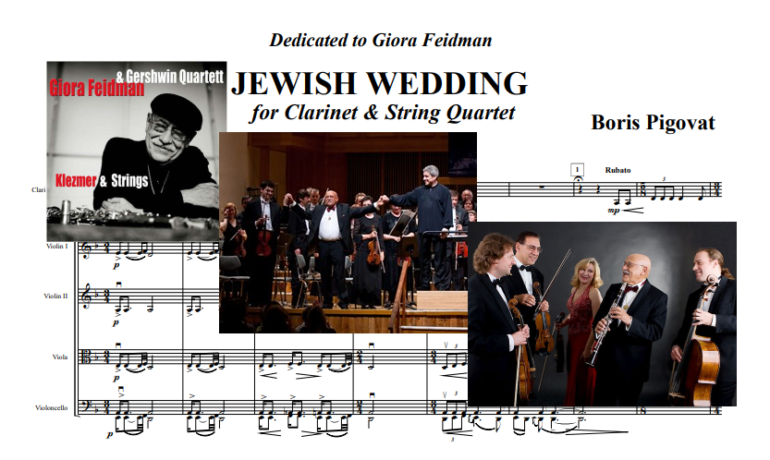
Jewish Wedding / Tzfat (2002 - 2008)
- Duration: ca. 10 minutes
In 2001 I met Giora Feidman, a world-wide famous clarinetist and performer of klezmer music. He gave me a couple of his CDs. I was so impressed by his performance, that I decided to write a piece in klezmer style, a kind of klezmer rhapsody, and to dedicate it to him.
As a composer-in-residence at the Petach-Tikva Conservatoire, I was committed to write a piece for trombone and wind orchestra.
I decided to write this piece as a klezmer rhapsody and to name it Tzfat (Safed), the name of a city where klezmer music festivals take place yearly.
Tzfat for trombone and wind orchestra was written and performed in 2002 (see recording, below).
In 2004 I prepared a version of Tzfat for violin and string orchestra, which was also performed (see recording, below).
In 2008 I met Giora Feidman again, and he listened to Tzfat. He loved the composition, and he asked me for two additional versions of it: one for clarinet and string orchestra and another for clarinet and string quartet. He also suggested to rename the piece to Jewish Wedding, arguing that, outside of Israel, people are unfamiliar with Tzfat.
The version for clarinet and string orchestra was performed by Giora with a string group of the Jerusalem Symphony Orchestra (see recording below). The version with string quartet was performed the with Gershwin Quartet more than 30 times – in Germany, Austria, Holland, Switzerland, Russia and Ukraine. See below for a YouTube video from a performance in the Berliner Philharmonie concert hall.
Later, at the request of other performers, I prepared additional versions of this Jewish Wedding / Tzfat:
- for Trumpet and Strings (arranged for ensemble of members of Israel Philharmonic Orchestra)
- for Piano Trio
- for Piano Quintet
- for Clarinet & Saxophones Quartet
- for Clarinet, Cello & Piano
- for Clarinet, Violin & Piano
- for Saxophone, Violin & Piano
In Israeli Sketches, a suite for wind orchestra, I re-used Tzfat content, but made it purely orchestral without any solo instrument.
Looking back to 2001, when I met Giora Feidman for the first time, I could not have imagined such exciting developments!
Below are the recordings.
Tzfat for Trombone and Wind Orchestra
Tzfat for Violin and String Orchestra
Ramat Gan Chamber Orchestra
Ohad Cohen (a 14-year old boy), Violin
Aviv Ron, Conductor
Ramat Gan (Israel), 2005
Jewish Wedding for Clarinet and String Orchestra
Jewish Wedding for Clarinet and String Quartet
Giora Feidman and
Gershwin Quartet
Recorded for Klezmer & Strings CD, release by Pianissimo Musik
2009
